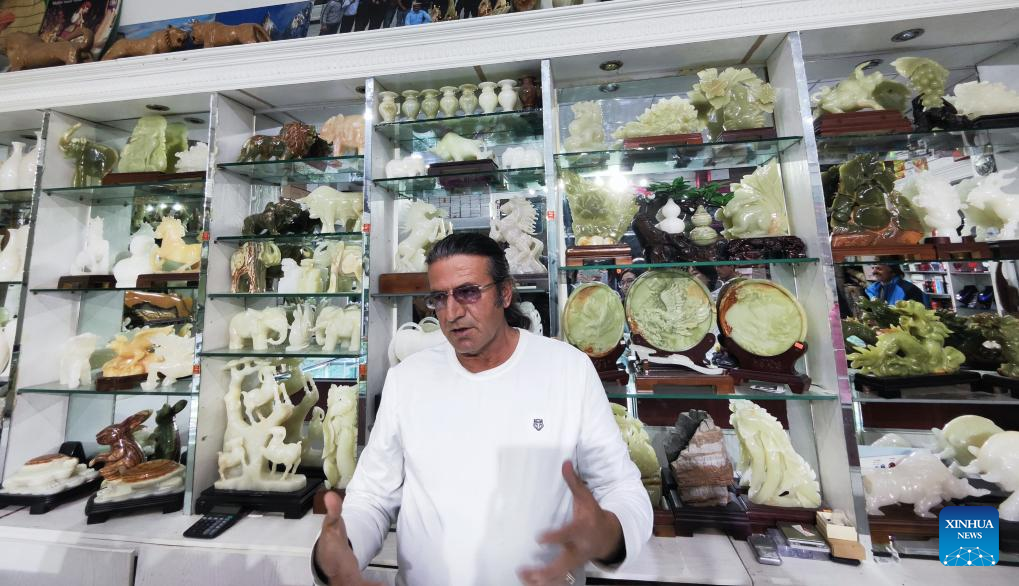
Murad Shah, a Pakistani jeweler, speaks during an interview near the Khunjerab Pass in Taxkorgan Tajik Autonomous County, northwest China's Xinjiang Uygur Autonomous Region, on Nov. 5, 2023.(Xinhua/Wang Xinyi)
URUMQI, Nov. 8 (Xinhua) -- It was early November, but the temperature already dropped to below zero degrees Celsius before sunset near the Khunjerab Pass on the Pamirs, at an average altitude of 4,700 meters.
Several transit passengers dropped by to sip a cup of warm cappuccino, tumoro tea or pick up some qeema at the Hunza Kitchen, a small restaurant serving Pakistani cuisine, before they passed through the only land port linking China and Pakistan.
"We have about 50-60 people dining here daily, and during the peak season, we have more people coming. The Chinese enjoy our Pakistani food!" said 46-year-old restaurant owner Muhammad Aslam, who named the restaurant after his hometown in the Hunza Valley, northern Pakistan.
Aslam and his family have been running their home business here in Taxkorgan Tajik Autonomous County, northwest China's Xinjiang Uygur Autonomous Region since 2017. Thanks to facilitated transit and booming trade, they are now able to ship ingredients within a day or two and are mulling expanding business elsewhere in China together with fellow villagers.
"The documents are clear, and we are very happy doing business here in China," he told Xinhua, adding that both the governments and people here have helped them a lot. "They are very friendly and cooperative."
As night fell in Taxkorgan, colorful neon lights flickered on both sides of an exotic street lined with Pakistani stores, creating a lively vibe. Pakistani Murad Shah was meticulously displaying his pieces of jewelry and wiping down his shop windows.
Every day, there are about 100 to 200 visits, said the jeweler, who started trading goods including gemstones between Pakistan and China as early as the 1990s and settled down here, attracted by the favorable business environment and huge market potential.
"China is flourishing day by day, becoming one of the leading economies in the world ... and many Pakistanis, including my friends, spot the opportunities and prefer to do business here," he said.
Describing himself as a beneficiary of the China-Pakistan Economic Corridor, a flagship project under the Belt and Road Initiative, Shah was bullish on the future business outlook of Xinjiang, particularly with the inauguration of the Xinjiang Pilot Free Trade Zone, which officially started operations this month.
The corridor and the Belt and Road, he said, are "the junction, from which Pakistani and Chinese can do good business and connect everywhere."
Taxkorgan, the once "forbidden zone" and isolated town on the Pamirs, dominated by perennial harsh temperatures and thin air, has increasingly emerged as a Central Asian highland for business and trade, as more traders settle down to tap the local potential and more tourists come to discover the unique charm of its natural scenery, which remains underreported.
"We are here for traveling in Urumqi and Kashgar, and have come here to China several times," said Fariza, who is waiting to return to Khorog, Tajikistan with her mom Zamira through the Karasu port in Kashgar, another land border crossing on the Pamirs connecting Tajikistan and China.
To ensure smooth customs clearance procedures for passengers at ports, Xinjiang customs departments have rolled out plans based on the characteristics of each port. Border inspection authorities have also increased the publicity of exit and entry policies and made arrangements for accommodation and catering at ports.
Thanks to convenient transport and swift customs clearance, Fariza and her family could travel frequently and see with her own eyes the dramatic changes in China, which are vastly different from what she experienced several years ago at the tender age of 15. She was excited about everything here in China and couldn't wait to share with her friends, who are also longing to visit this neighboring country.
Fariza said she is currently picking up some buzzwords in Chinese and learning to use the messaging app WeChat and other Chinese apps so that she can connect with her friends and plan her tours better.
"It's near and the culture is different from ours," she said. "It's always interesting to see and experience different cultures." ■




 A single purchase
A single purchase









